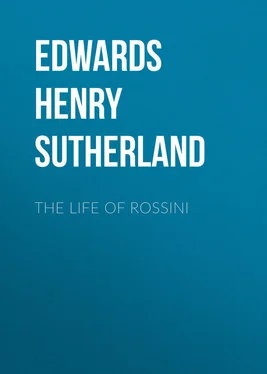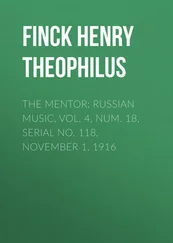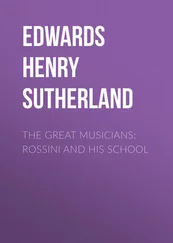Henry Edwards - The Life of Rossini
Здесь есть возможность читать онлайн «Henry Edwards - The Life of Rossini» — ознакомительный отрывок электронной книги совершенно бесплатно, а после прочтения отрывка купить полную версию. В некоторых случаях можно слушать аудио, скачать через торрент в формате fb2 и присутствует краткое содержание. Жанр: foreign_antique, foreign_prose, на английском языке. Описание произведения, (предисловие) а так же отзывы посетителей доступны на портале библиотеки ЛибКат.
- Название:The Life of Rossini
- Автор:
- Жанр:
- Год:неизвестен
- ISBN:нет данных
- Рейтинг книги:4 / 5. Голосов: 1
-
Избранное:Добавить в избранное
- Отзывы:
-
Ваша оценка:
- 80
- 1
- 2
- 3
- 4
- 5
The Life of Rossini: краткое содержание, описание и аннотация
Предлагаем к чтению аннотацию, описание, краткое содержание или предисловие (зависит от того, что написал сам автор книги «The Life of Rossini»). Если вы не нашли необходимую информацию о книге — напишите в комментариях, мы постараемся отыскать её.
The Life of Rossini — читать онлайн ознакомительный отрывок
Ниже представлен текст книги, разбитый по страницам. Система сохранения места последней прочитанной страницы, позволяет с удобством читать онлайн бесплатно книгу «The Life of Rossini», без необходимости каждый раз заново искать на чём Вы остановились. Поставьте закладку, и сможете в любой момент перейти на страницу, на которой закончили чтение.
Интервал:
Закладка:
It was indeed with some fear and trepidation that Rossini witnessed the preparations for the first performance of “Tancredi.” He had not met the Venetian public since that affair of the lamp-shade accompaniment, into the humour of which they had positively refused to enter; and it was not at all certain that by way of a practical joke on their side, they would not hiss a work which the composer meant this time to be enthusiastically applauded. The manager of the Mosè, moreover, was now an enemy of Rossini, and, independently of that, would certainly not be sorry to hear of a failure at the “other house.” The Fenice, then, was full, the musicians of the orchestra were at their posts, the time for commencing the overture had arrived, and still Rossini was nowhere to be found.
It was at that time the custom in Italy for the composer of a new opera to preside at its representation three successive times; but Rossini seemed determined to escape at least one of these trial performances.
However, he intended the overture as a sort of peace-offering. It was begun in his absence under the leadership of the first violin; and the first allegro was so much applauded that Rossini at once felt justified in leaving his hiding place by the entrance to the orchestra and taking his seat on the conductor’s chair. The crescendo, a means not invented by Rossini, but employed by him more persistently and with more success, than by any other composer, produced an effect which was repeated again and again in subsequent works, and never once too often. In fact, the whole of the animated and rather joyous prelude to what, if not a very serious opera, is at least an opera on a very serious subject, was received with expressions of delight.
No operatic overture was at one time more popular than that of “Tancredi.” Perhaps it is our fault as much as that of the music, if it appears a little old-fashioned now. Certainly it is trivial in character. It does not fill the mind with thoughts and visions of noble deeds; nor does it present the slightest picture of the crusades as a modern programme-overture (with the aid of the programme) might do. But it caused the Venetians to forget the affair of the lamp-shade accompaniment; it predisposed them to enjoy the melodic beauties of which “Tancredi” is full; and, reduced for the piano-forte, it became, during only too long a period, an effective show-piece for young ladies.
The crescendo, which pleased the audience in the overture, must have delighted them in the concerted finale, where it is reproduced on a more extended scale. This effect is said to have been suggested to Rossini by a similar one in Paisiello’s “Re Teodoro.” But the great maker of crescendo movements before Rossini was Mosca, who circulated numerous copies of one of his pieces containing crescendo effects, by way of proving his exclusive right to manufacture them. He was very indignant with Rossini for interfering with what he had accustomed himself to regard as his own private monopoly, and always declared that he, Mosca, was the true author of Rossini’s celebrated crescendi.
Considering the very delicate relations subsisting between Rossini and the Venetian public, it must somewhat have alarmed him, when, the day before “Tancredi” was to be produced, he found that Madame Malanotte, the representative of the young hero, was dissatisfied with her first air.
Probably Madame Malanotte was difficult to please. At all events, it was necessary to please her; and Rossini went away from the theatre wondering what he could improvise for her in place of the cavatina she had rejected.
He went home to dinner – even the composer who has, at a moment’s notice, to satisfy the caprices of a prima donna, must dine – and told his servant to “prepare the rice;” fried rice being the Venetian substitute for macaroni, oysters, soup, no matter what first dish. During the few minutes necessary for frying and serving the rice, Rossini had begun to note down an air. The beautiful melody afterwards known as “Di tanti palpiti” had occurred to him; and this he had made the principal subject of the air to be sung by the fortunate Madame Malanotte on making her entry. The whole of the cavatina is beautiful; and if, as Stendhal says, the air of the allegro was borrowed by Rossini from a Greek hymn (Lord Mount Edgcumbe says that it is taken from some Roman Catholic service), then we ought to be very glad that Rossini did borrow it.
But no one who has ever heard the very primitive music of the Greek church will believe that the melody of “Di tanti palpiti” formed any part of it – certainly not in its present shape and setting. Berlioz is said to have admired the music of the Russian church; but then the Russians admired the music of Berlioz, and it is doubtful whether Berlioz admired “Di tanti palpiti.”
“It is said at Venice,” writes Stendhal, “that the first idea of this delicious cantilena, which expresses so well the joy of meeting after a long absence, is taken from a Greek litany; Rossini had heard it sung a few days before at vespers in the church of one of the little islands of the lagoons of Venice.” 6 6 M. Azevedo’s idea on the subject is certainly the best. “Since its production,” he says, “on the stage and in the universe it has been made the subject of a canticle for the Catholic Church, like all other successful airs. But a litany before the air and a canticle after the air are not the same thing.” M. Azevedo also rejects the rice.
“Aria dei rizzi,” however, was the name popularly given to it; and wherever the first idea came from, the melody, as it now exists, is eminently Rossinian in form and style. How many great singers have sung this lovely air, beginning with the celebrated Pasta, who played the part of Tancredi as long as she remained on the stage, and whose favourite piece, after she had left it, to appear only at concerts, was still “Di tanti palpiti?” It has been seen that Madame Malanotte was the original Tancredi at Venice; Madame Pasta was the first representative of the character in France and England, and Pisaroni, Malibran, and Madame Viardot-Garcia afterwards distinguished themselves in the same part.
The most brilliant Amenaide ever heard was probably Madame Sontag, who appeared in that character in 1829 to Malibran’s Tancredi .
CHAPTER VI
ROSSINI’S REFORMS IN COMIC OPERA
AS Rossini found the opera seria of his day too serious, so he found the opera buffa too broadly comic. He was accused of treating tragic subjects melodramatically – which meant that he made them interesting. In dealing with comic subjects he took care to keep above the level of farce, his general tone being that of comedy, into which he now and then, but not often, introduced a touch of sentiment (“Languir per una bella” in “L’Italiana,” “Ecco ridente il cielo” in “Il Barbiere”).
The old opera buffa, with its separate set of characters and singers, and its own separate style, musical as well as dramatic, died out under the influence of Rossini’s innovations. It is said to have been very fine, by those who liked it; but apparently Rossini did not like it, for after trying his hand at a few specimens (of which the notorious little operetta or farza with the lamp-shade accompaniment seems to have been the last) he abandoned it, as after a single trial (Velluti in “Aureliano in Palmira”) he abandoned the sopranists.
If Rossini ever wrote an opera seria in the old style, it must have been that work of his early youth, “Demetrio e Polibio,” of which all that seems to be known is, that it was composed in 1809 for the Mombellis, and produced at Rome in 1812.
It must have seemed strange and rather awful to some obstinate habitués (and habitués are often as obstinate as habit itself) that the same singer should come before them one night as Moses , and the next as Doctor Bartholo , one night as Figaro , and the next as Assur in “Semiramide.” At the same time they appear to have been annoyed with Rossini both because in his serious works he was not more severe, and because in his comic works he was not more grotesque.
Читать дальшеИнтервал:
Закладка:
Похожие книги на «The Life of Rossini»
Представляем Вашему вниманию похожие книги на «The Life of Rossini» списком для выбора. Мы отобрали схожую по названию и смыслу литературу в надежде предоставить читателям больше вариантов отыскать новые, интересные, ещё непрочитанные произведения.
Обсуждение, отзывы о книге «The Life of Rossini» и просто собственные мнения читателей. Оставьте ваши комментарии, напишите, что Вы думаете о произведении, его смысле или главных героях. Укажите что конкретно понравилось, а что нет, и почему Вы так считаете.












